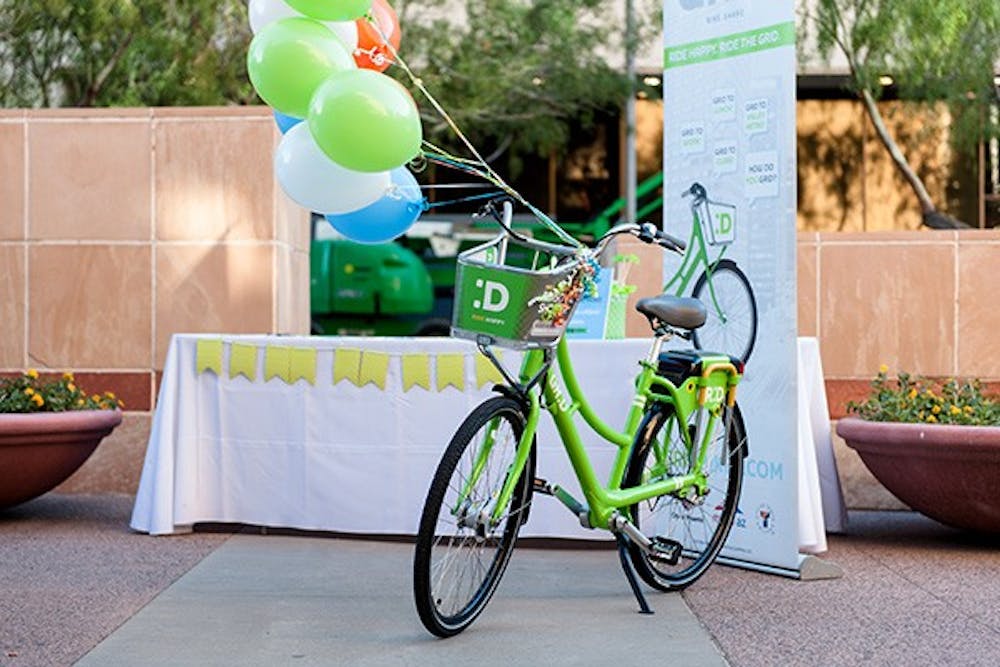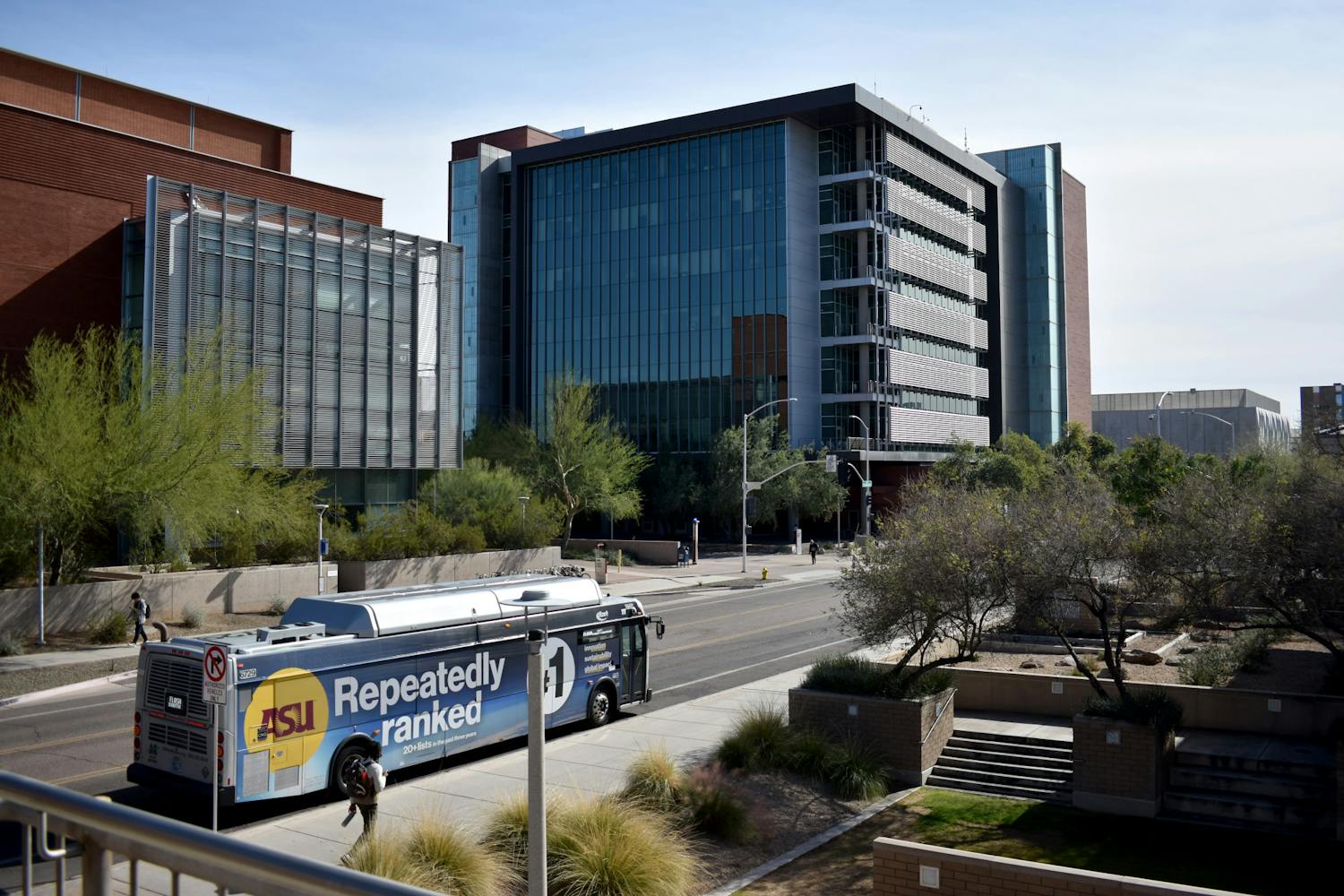[caption id="attachment_160412" align="alignleft" width="600"]![(From left) Arizona Diamondbacks mascot Baxter, Phoenix city councilman Bill Gates, [still looking for name], Phoenix mayor Greg Stanton, GridBikes CFO John Romero, Phoenix Deputy Street Transportation Director Charlene Reynolds, Social Bicycles founder Ryan Rzepecki, Phoenix deputy city manager Rick Naimark and CycleHop founder Josh Squire take part in the ribbon-cutting ceremony to inaugurate a bike-sharing program sponsored by the City of Phoenix, Tuesday, Nov. 25, 2014 outside the Orpheum Theater in Phoenix. The bike-sharing program is the first of its kind in Phoenix and is expected to expand to 50 locations throughout the city. (Photo by Ben Moffat)](http://www.statepress.com/wp-content/uploads/2014/11/Grid-Bikes-Ribbon-Cutting-011.jpg) Arizona Diamondbacks mascot Baxter, city officials, and bike share supporters take part in the ribbon-cutting ceremony to inaugurate a bike-sharing program sponsored by the City of Phoenix, Tuesday, Nov. 25, 2014 outside the Orpheum Theater in Phoenix. The bike-sharing program is the first of its kind in Phoenix and is expected to expand to 50 locations throughout the city. (Photo by Ben Moffat)[/caption]Following in the footsteps of 36 major cities nationwide, Phoenix has finally established a bicycle-sharing system. Mayor Greg Stanton said Grid Bike Share will boost the economy and help enhance residents' health.
Arizona Diamondbacks mascot Baxter, city officials, and bike share supporters take part in the ribbon-cutting ceremony to inaugurate a bike-sharing program sponsored by the City of Phoenix, Tuesday, Nov. 25, 2014 outside the Orpheum Theater in Phoenix. The bike-sharing program is the first of its kind in Phoenix and is expected to expand to 50 locations throughout the city. (Photo by Ben Moffat)[/caption]Following in the footsteps of 36 major cities nationwide, Phoenix has finally established a bicycle-sharing system. Mayor Greg Stanton said Grid Bike Share will boost the economy and help enhance residents' health.
“This is another key accomplishment for Phoenix,” Stanton said during the launch Tuesday.
Since late last year, Phoenix has fought several delays in the launch after issues arose regarding the bike’s high-tech components.
The “smart-bikes” use a one-of-a-kind solar-powered GPS system. This technology not only tracks the location of the bike, but it also allows the rider to report a problem, follow the amount of miles rode and track the number of calories burned.
Monica Hernandez, public information officer for the City of Phoenix’s street transportation, said delays with the program’s launch were due to the development of the technology within the bikes.
 Arizona Diamondbacks mascot Baxter crosses the “green carpet” before a ribbon-cutting ceremony to inaugurate a bike-sharing program sponsored by the City of Phoenix, Tuesday, Nov. 25, 2014 outside the Orpheum Theater in Phoenix. The bike-sharing program is the first of its kind in Phoenix and is expected to expand to 50 locations throughout the city. (Photo by Ben Moffat)
Arizona Diamondbacks mascot Baxter crosses the “green carpet” before a ribbon-cutting ceremony to inaugurate a bike-sharing program sponsored by the City of Phoenix, Tuesday, Nov. 25, 2014 outside the Orpheum Theater in Phoenix. The bike-sharing program is the first of its kind in Phoenix and is expected to expand to 50 locations throughout the city. (Photo by Ben Moffat)“We wanted to make sure the program had the latest technology,” Hernandez said. “It took a while for (the technology) to be established, tested and developed. With the technology, it’ll be more convenient for anyone to return their bike wherever they’d like, including non-Grid bike stations.”
During the announcement, Stanton said the program will make Phoenix “a more attractive place to live and visit.” Not only will the availability of bikes enhance the health of citizens in the city, it will also help boost the local economy.
The city program estimated the program will generate $750,000 in annual payroll.
Hernandez explained how Grid bikes will provide citizens with more short-term transportation options and will allow them to avoid obstacles that come with living in a big city, such as traffic.
“People can use these bikes, for example, to get from the light rail to a destination that they would have had to walk to,” Hernandez said. “The bikes will replace walking long distances and allows people to get around obstacles that come with driving, such as traffic and parking.”
The program has taken a lot of outside support in order to initiate the launch, Grid Bike Share ambassador Yvette Hughes-Duenas said.
“With the support of groups such as Phoenix Spokes People, we have been fighting to make the streets safer and promote a healthy lifestyle,” Hughes-Duenas said.
Marc Adams, a professor at ASU’s School of Nutrition and Health Promotion, said he was very pleased with his level of comfort and the amount of convenience during his first run of the program.
“The bike was very comfortable and very easy to use,” Adams said. “The hot topic in sustaining a city right now is walkability. Cities need to be very walkable. I live within a mile of the light rail, and being able to pick up a bike then drop it off at a kiosk in front of the Starbucks and go to ASU is very convenient.”
Jan Hertzfeld, fitness coordinator for Maricopa County employees, has been testing out the bikes before today’s launch. She said she has had a very positive experience with the bikes through a “bike to work” group and hopes to implement the system into a program involving her clients.
 A Grid bike is displayed before a ribbon-cutting ceremony to inaugurate a bike-sharing program sponsored by the City of Phoenix, Tuesday, Nov. 25, 2014 outside the Orpheum Theater in Phoenix. The bike-sharing program is the first of its kind in Phoenix and is expected to expand to 50 locations throughout the city. (Photo by Ben Moffat)
A Grid bike is displayed before a ribbon-cutting ceremony to inaugurate a bike-sharing program sponsored by the City of Phoenix, Tuesday, Nov. 25, 2014 outside the Orpheum Theater in Phoenix. The bike-sharing program is the first of its kind in Phoenix and is expected to expand to 50 locations throughout the city. (Photo by Ben Moffat)The launch brought with it the easy accessibility of over 100 bikes at 27 stations around the city.
By the time Super Bowl XLIX comes to Phoenix in February, there will be twice as many bikes available, Stanton announced. The program is expected to expand into Tempe and Mesa by next year.
Renting a bike will cost just $5 an hour. Monthly and yearly memberships are also available for $39 and $79.
Students looking to increase their physical activity, explore the city and save a buck can purchase a yearly membership for just $59. All members get one hour of free riding time per day, with any combination of rides.
Memberships can be purchased online at app.SocialBicycles.com, through mobile apps available on both Apple and Android phones, or at any one of the bike kiosks. Once a bike has been reserved, a four-digit PIN code is used to unlock the bike. Bikes can be returned at any one of the 27 conveniently-placed “Grid Locks” located throughout the city for no charge, but returning it to a non-Grid bike station will cost riders a $2 fee.
With the launch of this program, Stanton said he will continue to advocate for the continual growth of one of the nation’s largest metropolitan cities.
“Phoenix is moving forward,” he said.
Reach the reporter at Jlsuerth@asu.edu or on Twitter at @SuerthJessica.
Like The State Press on Facebook and follow @statepress on Twitter.




